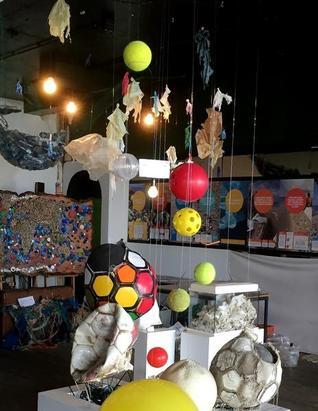Every parent has watched bemused as excited kids toss aside gifts to play with the boxes instead. But what about when they ignore the shells on a beach in favour of plastic bottle tops?
That was the puzzle for Ralph Groenheijde when he and his family visited Costa Rica a few years ago. The trip sparked a passionate crusade to clean up the beaches back home in the Netherlands.
His then two-year-old son paid little heed to the shells, collecting instead dozens of brightly coloured bottle tops. Eventually they used them to create a giant sun mosaic on the sand, before depositing them in a bin.
It was to trigger Groenheijde’s scheme not to just clean up the wide, sandy beaches skirting the coast of The Hague, but also to turn an unwanted “treasure trove” of trash into works of art.
This summer’s creations have been gathered in the new TrashUre Museum, where lost balls and multi-coloured plastic spades dangle like decorations from the ceiling.
Candy wrappers adorn a top hat tied with blue string, and a cascade of flipflops makes a rainbow floor sculpture. A blue fisherman’s net is hooped and hung as a dress on a dummy.
On a trash hunt
Harnessing the power of social media, Groenheijde organised his first trash hunt in the Netherlands some three years ago and built a pirate ship in the sand with the finds.
“The moment that it was finished the kids came and started playing with it,” Groenheijde, 44, a trained therapist and counsellor, told AFP.
“From that moment on I began calling the trash can a treasure chest, and from now on we are treasure hunters. We are pirates. We are saving animals. We are heroes because of that.”
When a friend offered him the free use of a building on the Scheveningen seafront, Groenheijde hit on the idea of a museum for the artworks.
Now he guides groups of adults and children daily on sorties, motivating them to clean up the environment, to get out and exercise and stretch their muscles as well as their imaginations.
This summer he set locals a 90-day challenge to scour the sands every day.
Since the end of June he calculates they have scooped up some 40 tonnes of garbage, all of which are disposed of in bins.
These finds come despite efforts by local authorities. A 15-strong council crew heads out nightly using tractors and beach cleaners “digging and raking the waste from the sand” for 10 hours from the 11-kilometre stretch of beach.
Annually 1.9 million euros are spent by The Hague to keep the beaches clean, and on a single busy day they can collect up to about 1,000 square feet of trash from over 400 large bins and the shoreline, a spokesman for the city said. That’s equivalent to 20 king-size beds.
The dirtiest finds are also why Groenheijde calls his TrashUre hunters heroes for “daring to take care of the toilet” — no-one wants to clean the toilet at home, but someone has to.
Bags overflowing
“I never expected to collect so much rubbish in 15 or 20 minutes. I was very surprised,” said Jawad el-Woustati, who was among 20 young trainees from The Hague municipality sent to join Groenheijde on one expedition.
Source: AFP











